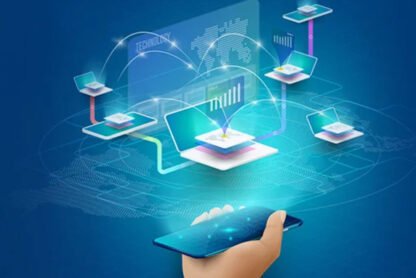In today’s digital age, data is the driving force behind innovation and decision-making across industries. From healthcare to finance, businesses rely heavily on data-driven insights to fuel their growth. A key trend emerging in the data ecosystem is the evolution of automated data-sharing technologies, which aim to make the exchange of data faster, more secure, and more efficient.
A report from Statista predicts that global data creation will reach more than 394 zettabytes by 2028, highlighting the increasing demand for efficient data-sharing options. This notable rise in data creation underscores the need for advanced technologies to automate and enhance data transfer processes. An important advancement in this field has been the development of blockchain interoperability protocols, facilitating seamless data exchanges across different blockchain networks.
Blockchain Interoperability Protocol: A Game-Changer for Data Sharing
Blockchain technology—ushering in a new era of data storage and transactions with unmatched transparency, security, and decentralization—faces significant challenges due to its networks’ limited interoperability. Until recently, each blockchain operated in isolation, unable to communicate or share data with others. This fragmentation hindered not only the capabilities of decentralized applications but also stifled data flow across platforms.
This is where the blockchain interoperability protocol comes into play. It is designed to bridge the gap between different blockchains, allowing them to share data and communicate with each other. The Inter-Blockchain Communication (IBC) protocol, developed by the Cosmos network, is one such example of this technology in action. It allows for the transfer of data and assets between blockchains with different consensus mechanisms and structures, making it possible for decentralized applications to interact across multiple platforms.
Blockchain interoperability protocols foster the development of integrated ecosystems by enabling cross-chain communication; consequently, industries—from finance to supply chain management—can leverage the unique strengths of various blockchain platforms more effectively. This accelerates innovation and ensures that organizations can operate efficiently in an interconnected world.
The Role of Smart Contracts in Automating Data Sharing
Blockchain interoperability protocols establish the groundwork for seamless data exchange; meanwhile, smart contracts—self-executing agreements with their terms encoded directly into software—instrumentalize the automation of this exchange. These contracts automatically execute and enforce the terms once predefined conditions are met, without the need for intermediaries.
Smart contracts facilitate information transfer between parties in data sharing. For example, they automatically validate and initiate the transfer of specific data upon an authorized entity’s request—ensuring exchanges are not only swift but also secure and efficient. Additionally, smart contracts enable the integration of encryption and access control; safeguards that ensure sensitive information remains accessible only to authorized individuals.
Smart contracts, with their automation capabilities, prove exceptionally valuable in industries prioritizing speed and accuracy. By reducing manual processes while bolstering security, these digital agreements establish new benchmarks for efficiency in our digital era.
Advancements in Distributed Ledger Technologies (DLT)
Distributed ledger technologies (DLTs)—cornerstones in the automated data-sharing evolution—stand out for their decentralized structure. Unlike traditional databases, no single entity controls them. Blockchain emerges as the most renowned DLT variant; however, alternative forms such as directed acyclic graphs (DAG) increasingly gain attention due to their capacity to enable decentralization.
DLTs’ inherent transparency and immutability render them perfect for automating data exchanges. Once recorded on a distributed ledger, the data becomes unalterable and impervious to tampering—this ensures information integrity and accuracy. Such attributes are critical in sectors such as healthcare, finance, and supply chain management where trust and reliable data reign supreme. As DLTs continue to evolve, their scalability and energy efficiency improve—increasingly rendering them suitable for high-volume, real-time data transfers.
For instance, new consensus mechanisms are being developed to enhance the scalability and energy efficiency of DLT networks, making them even more suitable for high-volume, real-time data exchanges. These advancements will allow for faster and more reliable data sharing, enabling businesses to make more informed decisions based on real-time insights.
The Impact of Artificial Intelligence and Machine Learning
Artificial intelligence (AI) and machine learning (ML), when integrated into automated data-sharing technologies, unlock new possibilities for efficiency and innovation. By analyzing copious shared data, these algorithms reveal patterns, trends, and insights that might otherwise stay concealed—enhancing the process of data sharing while transforming how organizations utilize this wealth of information.
AI-driven algorithms actively identify data exchange anomalies to maintain secure, malicious-free processes; meanwhile, machine learning models streamline and accelerate data-sharing protocols continuously. In healthcare industries, AI scrutinizes patient data in real time—spotting potential health risks and facilitating early interventions. The fusion of automation and intelligence maximizes shared data value; it transforms this information into actionable insights, driving enhanced outcomes.
AI and ML technologies, as they advance, are set to increasingly impact automated data sharing. These systems offer transformative opportunities from predictive analytics to autonomous decision-making—redefining organization-data interactions. By facilitating smarter, faster, and more secure exchanges of information, AI and ML equip businesses with the tools necessary for remaining at the forefront of a competitive digital economy.
The Future of Automated Data-Sharing Technologies
Automated data-sharing technologies’ future brims with potential. As blockchain interoperability protocols, smart contracts, and distributed ledger technologies evolve, they propel the speed, security, and efficiency of data exchanges to unprecedented levels—advancements that allow organizations to harness their full data capacity, spurring innovation and yielding superior outcomes industry-wide.
The integration of AI and ML will enhance automated data-sharing systems. It will enable real-time decision-making, improve the accuracy and security of exchanges, and play a crucial role in future digital ecosystems. Over time, we can expect such seamless integration into all business operations—from supply chain management to customer engagement.
Conclusion
The advancement of automated data-sharing technologies is not just changing how companies engage with data but is also establishing the groundwork for a more interconnected and efficient digital landscape. Through advancements such as the blockchain interoperability protocol and the incorporation of AI and ML, we are experiencing the emergence of a new age in data exchange—characterized by increased speed, intelligence, and security like never before.









